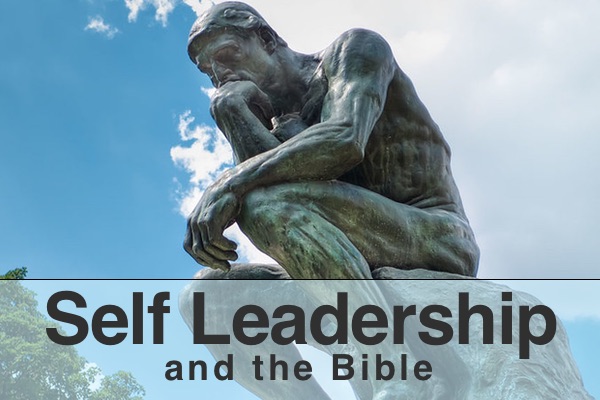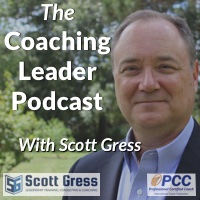
We can easily find leaders in the Bible like Abraham, Moses, David, and St Paul. We can even find “leadership” roles elder (presbyters), bishop and overseer (episcopos). There’s deacon and apostle and of course, shepherd. There’s even the concept of builder and steward which imply a responsibility over someone or some thing. These are important words and roles and concepts. Yet, at first glance there seems to be not a lot when it comes to self leadership.
Sure there is the admonition to pay attention to one’s words and actions. There is the instruction and warning of the ten commandments as well as many other words of Jesus and the Scriptures that address the same. One can surely argue that such teachings are indirectly, if not directly enough, exhorting us to lead ourselves in keeping with the faith. As redeemed children of God we are to reflect Jesus Christ with all His virtues and qualities. Certainly this side of heaven we are limited in doing that, albeit empowered by His Spirit. Yet that is the goal. We are to be, as Martin Luther once said, “little Christs.”
But the concept of self leadership in the literature today seems to say more. Self-leadership theory has been described as the “process of influencing self” as opposed to (or prior to) the influence of leaders over followers (Charles C Manz, 1983). It is said to involve self talk, managing ones thoughts and even using visual imagery to effect performance. It involves knowing how to motivate self for tasks you don’t like or in the context of work and teams. One can quickly see how such a discipline would be beneficial for not only a leader, but for anyone in virtually any situation. It also makes sense. If we have no “governor” or on our thoughts and words and behaviors, or no goal, then that will have potentially disastrous ramifications on not only our own life but those we attempt to lead. If done poorly, we will quickly find ourselves without the position or responsibility of leadership. You fill in the blanks with stories of leaders you have seen over the years. Their actions or inactions have brought them down and those around them as well.
But aside from the general admonitions of Scriptures to be good, can we find this anywhere else in the Bible? Short of finding the term “self-leadership” we can certainly find the concept if not the direct teaching.
“Here is a trustworthy saying: Whoever aspires to be an overseer desires a noble task. Now the overseer is to be above reproach, faithful to his wife, temperate, self-controlled, respectable, hospitable, able to teach, not given to drunkenness, not violent but gentle, not quarrelsome, not a lover of money. He must manage his own family well and see that his children obey him, and he must do so in a manner worthy of full respect. (If anyone does not know how to manage his own family, how can he take care of God’s church?)” 1 Timothy 3:1-5.
When talking about an overseer, or episcopos, Paul makes the direct connection between how one manages one’s self, both in positive attributes and behaviors and negative ones, how one manages one’s family and children, and then the greater responsibility of “taking care” of God’s church. The point is pretty clear. If you can’t manage yourself and the intimate, responsibility of your family with those few people, then how can one presume to manage or take care of God’s church?
The principle has been expressed by Jesus this way, “Whoever can be trusted with very little can also be trusted with much” Luke 16:10. So how are we doing in the “little” things that have been entrusted to us?
First, how are you managing yourself? Your thoughts, your words and your behaviors? How are you managing your own body? Your sleep, your diet, physical activity, drinking or other? How are you attending to your personal needs and those of your family? Are you overworking? (What is behind that?) Are you underworking or lazy? (What is behind that?) Are you attending to them, teaching them, guiding them, investing yourself in them? Or are they getting the spare moments and effort?
But most important is your self understanding in relationship with God. How do you see yourself, and what do you believe about your relationship to God? Do you know and are you convinced of the words and promises of Jesus, that you are His forgiven, baptized child? Do you see your very identity in Him? Do you rest in that truth and promise of God when the triggers of shame avoidance and approval seeking come upon you? Do you instead react in your thoughts words and deeds or do you go forward with intentionality and the support, correction and encouragement of fellow believers?
The depth of our faith and trust in Jesus will tell the tale of the health of your self leadership. Our self concept in relation to God and our self management has a huge impact on our leadership.
Yes it is Biblical. Yes it is Christian. Yes it is practical. Yes it is absolutely critical if you want to be a leader or a better leader. You can only lead others to the extent that you can lead yourself. Our ability to grow as a leader is based upon our ability to grow as a person. For the Christian leader though, the ability to do that begins with the sure foundation of the Gospel.
So where do you need to grow in your self leadership?
Rev. Scott Gress is believes in Growing People for Ministry by focussing on leadership, discipleship and teamwork. Contact Scott if you are interested in him working with you or your church. A free 30 minutes sample session is available to explore how you might work best together. The Coaching Leader Podcast is also available on iTunes and his YouTube page. You can contact Scott through email scottgress@me.com or his blog page scottgress.com or at 561-542-4472
[mc4wp_form]"Growing People for Ministry" Leadership + Discipleship + Teamwork
Check out the: Coaching Leader Podcast!

